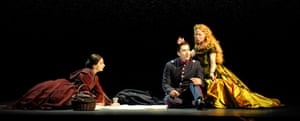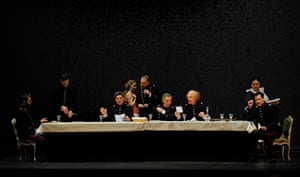 |
| FANNY ARDANT Photo by Eric Rober |
Fanny Ardant: 'I suffer profound despair – I see things noir'
Fresh from directing Gérard Depardieu in the role of Stalin, the French star is now staging Sondheim’s Passion in Paris. She talks about the art of pretending, embarrassing her children and the power of love
Fanny Ardant says she is very good at pretending. And not only on stage or in front of a camera. The French actor is lounging in the foyer of the Châtelet theatre in Paris where she is directing her first English-language musical, Stephen Sondheim’s Passion. She is laughing, her eyes sparkling, her hands – fingers heavy with chunky silver jewellery – are flapping, wringing and pushing hair from her face.
The conversation has moved on from the delights of non-conformity and putting “cretins” in their place via the pleasure of working with Gérard Depardieu, Franco Zeffirelli, François Truffaut – with whom she had the second of her three daughters – and Roman Polanski. Now she is on the subject of depression. The topic is darker, but not the mood. Ardant, 66, continues to fizz like freshly opened champagne. “I am a pessimist by nature,” she says. “I see things noir. I have a great black veil that falls over my head. I have never seen a psychoanalyst, though. I think if I did I would cry and cry a torrent of tears and never stop.”
Noticing a look that suggests this might be a little melodramatic, she adds: “I do suffer profound blackness and despair, but I am an actress. What saves me is movement. When I am not happy, I move. I say to myself: ‘I will think about this later,’ then I get on with the moment. I could cry from morning to night but I pretend. I smile, and I pretend.”
Ardant is delightfully friendly, polite and anxious to please yet simultaneously exudes a sense of imminent chaos and calamity, not to mention deliberate mischief-making. She has a well-deserved reputation for saying things to shock. She even convinced one interviewer that she was the baby in the pram that rolls down the Odessa steps in Battleship Potemkin. (“I wasn’t even born when the film was made … but the journalist didn’t check.”)
Today, the star of more than 60 films, 30 theatre productions and 20 television dramas has chosen to espouse her carpe diem philosophy and her belief that the only thing of value in life is love. It follows, therefore, that she is a huge fan of Fosca, Passion’s ailing and sickly heroine, who has an obsessive love for the army captain Giorgio. “Oh yes, I love Fosca. Her heart was broken when she was young. She is unhappy, lonely, but intelligent. She is like a pressure cooker you know will explode. She knows she will die, but she is not afraid to love or show she loves … People say I am always exaggerating, but the only thing interesting in life is love. Whether we are happy or not, love is the essential. Everything else – money, power, glory – just fills the hole left by an absence of love.”
Ardant says the magic of Truffaut, Zeffirelli and Polanski “was their passion. What I learned from them was this alchemy that I never completely understood. Zeffirelli would get very angry when you didn’t do what he wanted, but for me it meant they believed in what they were doing. I didn’t hear his anger, I heard his passion. I always try to find that same passion.”
Ardant, daughter of a cavalry officer, grew up in Monaco, where her colonel father was a friend of Prince Rainier. She studied international relations at the elite Sciences-Po university in Aix-en-Provence and was 29 when she made her first film. She then hit the international scene in 1981 playing opposite Depardieu in La Femme d’à Côté (The Woman Next Door) directed by Truffaut. In 2002 she starred as Maria Callas in Zeffirelli’s Callas Forever; she had previously played the celebrated opera singer a few years earlier on stage in Terence McNally’s Master Class, directed by Polanski.
She rails against conformity, describing herself as “uncompromising”. “My children have learned to live with the fact that I don’t conform, but it used to embarrass them terribly. I’m not an early riser, and when my first child was young I’d get up in the morning, put a belt around my nightdress, add a scarf, coat and wellington boots and take her to school. There’d be all these other mums made up to the nines. My daughter would say, ‘Mum, everyone’s looking at you … it’s summer and you’re wearing rubber boots!’ I didn’t care. I’d go home and back to bed.”
Ardant has just finished directing Depardieu in a low-budget film about Stalin. “I looked for a role suitable for him, someone with a big personality. Stalin is a complicated person, not all bad, and Gérard is ambiguous.” She says those who criticised Depardieu for going into tax exile underestimate him. “He was criticised by the ignorant. Gérard is intelligent and a free spirit. The world is his,” she says.
Our interview has stretched to twice the allotted time and Ardant has to get on. “People, Americans mostly, talk about ‘burnout’, this sudden collapse,” she says. “But I will not collapse, I will spontaneously combust,” she says, laughing. She leaps up and is off again, eyes sparkling, hands flapping, bubbling over.
• Passion is at the Châtelet theatre, Paris, 16-24 March
- This article was updated on 15 March. Due to a subbing error, an earlier version stated that Fanny Ardant studied at Sciences-Po university in Paris. This has been corrected.
- THE GUARDIAN





No comments:
Post a Comment